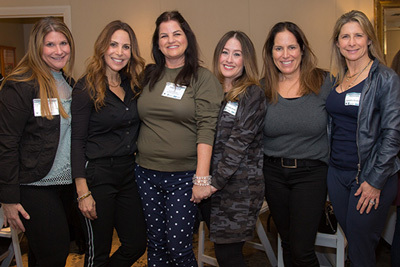Los Angeles Jewish Home Shares Expertise in Women’s Health


Los Angeles Jewish Home Shares Expertise in Women’s Health
As a leader in senior healthcare in Southern California, the Los Angeles Jewish Home has expertise that can benefit the entire community. Bringing that expertise to new constituencies is the goal of the Jewish Home's popular Women's Health Series—informative and exciting discussions hosted by The Executives, one of the Jewish Home's premier support groups.

The Women's Health Series features prominent UCLA physicians partnering with the Jewish Home to cover timely topics related to women's health. The series—launched in 2019—was envisioned as a way for the Jewish Home to provide informative educational health programming for the benefit of women across Los Angeles.
As initially conceived, the series consisted of in-person interactive luncheon events in the community. Over lunch, attendees would learn first-hand from leading physicians in their fields about a wide range of women's health issues, such as the aging process, along with the relationship between health and exercise. Participants also had an opportunity to hear from Noah Marco, MD, the Jewish Home's chief medical officer, while learning about how the Home plays a key role in the care of seniors throughout the community.
"With the Women's Health Series, we strengthened our terrific partnership with UCLA and created a forum that discusses important health issues that, all too often, go under-addressed in our society," Dr. Marco said. "Our audience is educated by renowned clinicians, most of whom are women. Our discussions enhance our members' health and well-being as well as empower them in their future discussions with their own health care professionals."
From the outset, the events were an immediate hit, selling out and bringing in more than 100 people each program. A big part of their appeal, notes Michelle Weisman, chair of the Women's Health Series and current president of The Executives, has been the sense of camaraderie the gatherings create.
"It's a really great, feel-good space. Women have our own unique health issues, and it's so nice to be able to sit together and talk about them," she says. "What's also nice is that the audience crosses generational lines—we have women from age 40 and up. We also have access to the leading medical minds in the country."
In addition to nurturing a supportive, positive environment for participants, the Women's Health Series also introduces more women to the impact the Jewish Home is having on the community. The Executives has traditionally been a more male-dominated group, something Michelle and her colleagues on the board have sought to change.
"When I first joined The Executives in 2014, I knew I wanted to get more women involved," Michelle recalls. "It's such an extraordinary group, but historically it drew its members from the business world, which limited its reach and left many women on the sidelines. Consider that in its nearly 30 years of existence, I'm the first female president; that tells you we had work to do."
The Women's Health Series has already helped the group make inroads. "My goal in launching the series was to have 50 new female members of The Executives, and we've done that," Michelle says. "We were gaining momentum when COVID-19 hit, which slowed us down somewhat."
Not one to be easily deterred, Michelle immediately picked back up the pace. Although the pandemic put a temporary halt to in-person gatherings, the Women's Health Series events moved to the virtual realm, enabling women to continue benefitting from the educational and social component and providing—through the cost of admissions—vital support to help keep Jewish Home seniors safe and healthy.
Women's Health Series members can look forward to upcoming programs including "Inflammation & the Female Body as We Age" (February 4th), "Hormones & Menopause: What Every Woman Needs to Know" (March 25th), and "Air Quality—What Are the Risks & How to Protect Yourself" (April 27th). All programs are currently taking place on Zoom.
Once women get a taste of the Women's Health Series, Michelle hopes they will be compelled to keep coming back for more. "It's such a lovely group of people, and it's a wonderful side benefit to know you're helping seniors thrive," she says. "I think the women who join us will feel, as I do, that being part of the Jewish Home adds a real depth of meaning to their lives."
To learn more about the Women's Health Series and The Executives, contact Cheryl Kater at [email protected] or at (818) 774-3331.
Be part of The Executives' upcoming winter program! On February 11th, Loyola Law School Professor Laurie Levenson will speak on "Helping Those Who Need Our Help the Most: the Work of Our Innocence Project." At this special event, admission is complimentary! Sign up now.